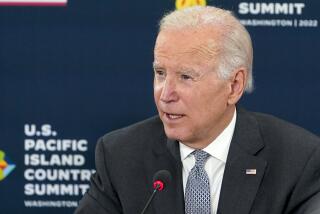YEN: U.S. Forges Ties With Pacific Rim Nations : Yen-Dollar Accord Seen as Turn to the East by U.S.
- Share via
WASHINGTON — The surprise U.S.-Japanese agreement to stabilize both the yen and the dollar through a series of coordinated economic moves, dismissed by some as a temporary election eve ploy, instead represents an important link in a chain of key policy moves by the United States to forge closer ties with the rising economic powers of the Pacific Rim.
That’s the view of a broad range of economic analysts, who also see the unprecedented bilateral agreement, announced Friday, as an attempt to avoid the nasty trade disputes that have periodically erupted in U.S.-Japanese relations ever since the early 1970s, when President Richard M. Nixon shocked Japan and others by slapping a stiff 10% surcharge on all dutiable U.S. imports, ending the traditional convertibility of the dollar into gold and later curbing soybean exports to Japan and other countries.
And even as the Administration turns closer to Japan, it also appears willing to tolerate more friction with Western Europe and its central economic power, West Germany.
“This is part of the Administration’s implied turn toward the Pacific that has to be raising some tough questions in Bonn,” said C. Fred Bergsten, director of the Institute for International Economics and a former Treasury official under President Jimmy Carter.
“It shows that the U.S. is willing to go to bat with Japan even when the Germans didn’t want to play along,” he added. “And on top of other foreign policy actions, such as the Iceland summit (in which President Reagan, without consulting with his Atlantic allies, discussed elimination of all U.S. nuclear missiles), the unease in European capitals must be rising.”
For American consumers, the action implies that prices of Japanese goods are likely to increase, but not as rapidly as they would have if the dollar had continued to weaken against the yen.
A crucial aspect of the Reagan Administration’s international economic strategy--led by Treasury Secretary James A. Baker III in the face of internal opposition from Commerce Secretary Malcolm Baldrige and other trade officials--is that the United States is now prepared to aid the rapidly worsening Japanese economy by calling a halt to the decline of the U.S. dollar against the yen--even if it provokes outcries from import-battered industries that want to see the dollar fall further to help make their goods more competitive against foreign products.
Dollar Could Strengthen
“There have been a lot of confusing signals from the Administration, but I think this move clears it up,” said Alan Reynolds, chief economist at the consulting firm Polyconomics, Inc. of Morristown, N.J., and an informal adviser to Rep. Jack Kemp of New York, the Republican presidential hopeful.
“Contrary to expectations, the goal is to have the Fed refrain from a new round of interest rate cuts and allow the dollar to strengthen somewhat rather than fall further,” Reynolds said, referring to the Federal Reserve Board. “Baldrige and (trade negotiator Clayton) Yuetter may not see it this way, but it surely is not in the U.S. interest to have Japan, Australia and much of the rest of Asia plunging into recession.”
For several months, the Reagan Administration has been prodding both Japan and West Germany to adopt more stimulative economic policies as a crucial element of its strategy to narrow the huge U.S. trade deficit.
Stronger growth abroad would benefit the sluggish American economy by turning foreign producers away from export markets toward satisfying their own domestic demand, while at the same time helping boost commodity prices for Latin America and other developing nations so they can again become major buyers of U.S. manufactured goods.
Germans Resist Pressure
But West German officials, convinced that their economy is growing fast enough, have resisted such pressure from the United States and European nations by arguing that lowering interest rates further runs the risk of re-igniting inflation.
Although West Germany welcomed Japan’s decision to cut its key discount rate to 3%, officials there also made it clear that West Germany’s central bank is not likely to follow suit soon.
“We don’t know what plans the Germans have,” a senior Treasury official said Friday, but no deal similar to the Japanese one is expected immediately with “other major industrial countries.”
With Bonn reluctant to go along, Treasury Secretary Baker decided that “the slowest horse in the stable could no longer hold the rest of the world back,” Bergsten said.
The U.S.-Japanese agreement, worked out during a series of secret meetings in San Francisco between Baker and Japanese Finance Minister Kiichi Miyazawa that began in September, also marks an effort to ensure that Japanese capital continues to flow to the United States and that trade conflicts do not flare up again between the two largest capitalist economies in the world.
More to Read
Sign up for Essential California
The most important California stories and recommendations in your inbox every morning.
You may occasionally receive promotional content from the Los Angeles Times.










